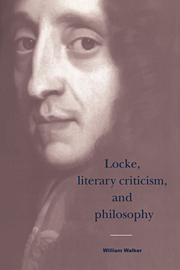1 - Locke, literary criticism, and philosophy
Published online by Cambridge University Press: 23 November 2009
Summary
For that is a great thing – when a book has once got a character, if it should be so dull that nobody should read it afterwards, it saves the reputation for centuries; this we have had instances of in others [besides Locke's Essay].
Coleridge, “Philosophical Lecture XIII”The practice of literary criticism in the last fifty years is both a precedent for the contemporary literary critic's concern with Locke's An Essay Concerning Human Understanding, and a goad to intensify that concern. This is because major critics of eighteenth-century literature and Romanticism have not only presented or assumed readings of Locke's Essay, but have made these readings instrumental to arguments regarding the shape of post-Renaissance literary genres, aesthetic theory, and, most generally, literary history. A brief survey of this criticism will serve to highlight this procedure as the common ground of otherwise distinct critics, establish the specific issues and assumptions in readings of Locke which are most crucial to the writing of literary history, and define the revisionary power of the reading of Locke presented in Part II of this study.
In John Locke and English Literature of the Eighteenth Century (1936), Kenneth MacLean presents what he takes to be the main ideas of each of the four books of the Essay and cites a range of eighteenth-century texts as evidence of the extensive “literary biographies” these ideas undergo. His practice of reading eighteenth-century literature in general as a direct response to Locke is also evident in Basil Willey's older but still current The Seventeenth-Century Background (1934).
- Type
- Chapter
- Information
- Locke, Literary Criticism, and Philosophy , pp. 3 - 28Publisher: Cambridge University PressPrint publication year: 1994



